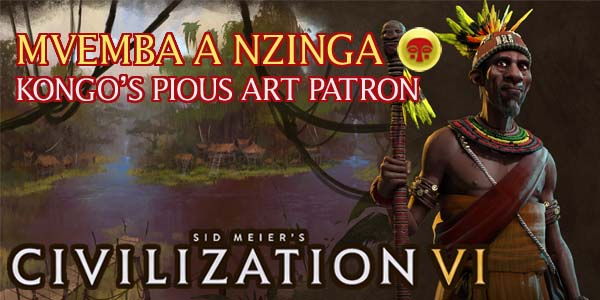
The Kingdom of Kongo was a small, but prosperous kingdom located on the west coast of sub-Saharan Africa. It can trace its origins back to the late 14th century, when Lukeni lua Nimi conquered the city of Mwene Kabunga and renamed it M'banza-Kongo. The city grew rapidly in an otherwise sparsely-populated region, and by the 17th century, it contained about one-fifth of the entire Kongo population (around 100,000 people). It's large population made it a prosperous and wealthy trading hub that eventually attracted the attention of European powers. The Portuguese set up colonies in Kongo territory, where they would set up a Roman Catholic church that would become one of the strongest churches in all of Africa. In 2017, the entire city of M'banza-Kongo was declared a UNESCO World Heritage Site.

In the first half of the 16th century, Kongo was ruled by Mvemba a Nzinga. His father converted to Christianity following the arrival of the Portuguese, and Mvemba a Nzinga added "Afonso" to his name, later becoming known as King Afonso I of Kongo. Afonso played a leading role in Kongo's conversion to Christianity and helped to establish and promote the Roman Catholic Church in the region. The reasoning for his conversion is unclear. Some scholars believe that he was motivated by genuine faith; while others believe that he was only complicit in the conversion in order to facilitate trade with European powers, and possibly to try to spare his population from becoming subject to the Atlantic slave trade. While Kongo had a slave economy of its own, and the kingdom willingly sold slaves to the Europeans, Afonso still denounced the Portuguese as exploiting Kongo's cooperation by kidnapping free Kongo citizens in violation of Kongolese law. The King of Portugal responded by dispatching officers to oversee the slave trade and ensure that only lawful slaves were sold to Europeans, and he demanded additional tribute from Kongo, such as wines and grains.
DISCLAIMER:
Civilization VI is still very early in its life-cycle. Strategies for the game (and for specific leaders and civs) may change as Firaxis applies balance patches, introduces new features, or expands the game through DLC or expansion packs, or as the Civ community discovers new strategies. As such, the following strategy guide may change from time to time. I will try to keep it up-to-date, and will make notations whenever changes are made. I'll also post links in the official 2K forums and CivFanatics, where I'll also report any changes made. If possible and practical, I will try to retain the original content of the strategy for posterity.
I welcome any feedback or suggestions that readers wish to offer. Feel free to post on the linked forums, or by posting a comment at the bottom of the page.
This guide is up to date as of the Summer 2017 patch (ver. 1.0.0.167) (Nubia DLC)
Kongo is a civilization that thrives in jungles and forest, growing massive (and productive) cities. Mvemba a Nzinga adds a unique religious flavor to the civilization by preventing it from being able to found its own religion, while simultaneously wanting other players to send their religion to you.
[More]
d42e1e83-3ee9-4f90-ab44-b8ddd956e2eb|1|5.0
Tags:Sid Meier's Civilization, Civilization VI, Kongo, Kongolese, Mvemba a Nzinga, Afonso I, Nkisi, religious convert, enthusiastic disciple, Ngao Mbeba, Mbanza, neighborhood, housing, appeal, religion, woods, rainforest, art, sculpture, archaeology, relic, artifact, museum, culture, slavery, Atlantic slave trade, unique improvement, unique melee unit, swordsman
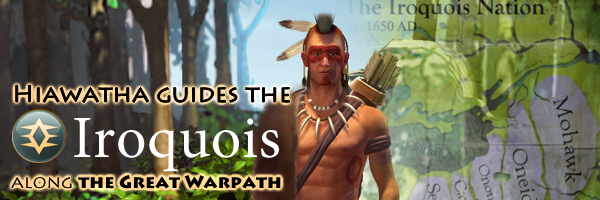
There's one civilization that I have not yet covered in my Brave New World strategies series that did receive an explicit rewrite of its unique national ability. I haven't covered them yet because that rewrite isn't so much a change to their ability, as it is really just a clarification that the ability applies to the new rules. The Iroquois civilization led by Chief Hiawatha has an ability that explicitly utilizes the expansion's trade route mechanics. The Iroquois are another civilization (like India) that receives a lot of hate from the Civ V gaming community due to some supposedly lackluster, highly-situational uniques. This strategy will focus on utilizing those uniques when they are beneficial, and on compensating for their downfalls and limitations.
Very little is known about the early history of Iroquoian people prior to the arrival of Europeans in the Americas. The Native American tribes had no written language, and their histories were passed down through oral tradition. According to that tradition, a great Peacemaker united the eastern Great Lakes tribes of the Mohawk, Oneida, Onandaga, Cayauga, and Seneca sometime between the 12th and 15th centuries. Other tribes would later join the confederacy, including some that were displaced from their native lands by European settlers. Iroquois culture was matrilineal, meaning that children were born into the mother's family, and women had a great deal of influence in the politics of the tribes. The Iroquois Confederacy utilized a representative system in which each tribe appointed a number of chiefs (based on relative population of the respective tribes) to serve on a council. There was both a council of male chiefs, and also a council of clan mothers that both had roughly equal authority.
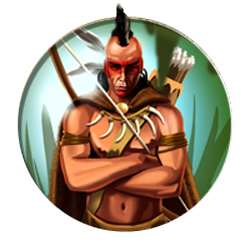
Hiawatha is a near-mythical figure in Iroquois history. He was a follower of the Great Peacemaker, who traveled between the various tribes of the region preaching a prophecy of a strong alliance uniting all the tribes of the Great Lakes region in peace. Hiawatha, along with the Peacemaker, effectively founded the Iroquois Confederacy using his skills as an orator (and, in some traditions, magic) to convince the various tribes to join. According to oral tradition, the Seneca resisted the alliance, leading to a confrontation that was stopped when the sun miraculously went dark, turning day into night. This supposed solar eclipse lead the Seneca to put down their arms and commit themselves to the alliance. [More]
070ae582-fddf-40f1-8379-9204a2c72f78|1|5.0
Tags:Sid Meier's Civilization, Civilization V: Brave New World, Civilization V: Gods & Kings, Civilization V, Iroquois, Hiawatha, Mohawk Warrior, Longhouse, Great Warpath, forest, jungle, food, deer, city connection, production, workshop, swordsman, Mohawk, Oneida, Onandaga, Cayauga, Seneca, Civ-V
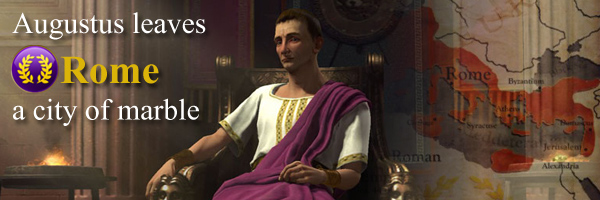
I've already covered strategies for the civilizations that have been added or explicitly changed in the Brave New World expansion and its major fall (2013) patch. Now I'm going to move on to other legacy civilizations that have not had explicit changes, but who may have had their strategies significantly altered by the expansions and other updates. This time, I will be covering one civ that surprisingly does not benefit from Brave New World's new mechanics as much as one might think: the Roman Empire.
Rome is one of the most influential and heavily romanticized cultures of the classical world. The early Roman republic was a system of semi-democratic representational government. Power was divided between two consuls who were annually elected by the citizens and alternated as military leaders to check each others' ambitions, while an appointed body of senators directed foreign policy and enacted laws. The city gradually expanded its power and influence in the second half of the first millennium BC through the overwhelming success of its legionary forces and defeat of its primary rival Carthage, until it eventually came to control almost the entire Mediterranean. Rome itself became the center of government and commerce for most of Europe, and it established an elaborate network of roads, aqueducts, and other engineering feats.
The Roman government was generally very tolerant of foreign religions and cultures, which helped to pacify subjugated peoples. But as Rome became an empire, and its holdings expanded, this tolerance became a liability. Foreign peoples were allowed admittance into the army in order to secure Rome's ever-increasing borders, which lead to a decline in loyalty to Rome as the army became more diverse and less centralized. Eventually, generals would begin competing with each other for control of Rome and the title of emperor, weakening the empire from within and making it vulnerable to external threats such as immigrating Germanic tribes displaced by the Huns. Eventually, these threats would culminate in the sacking of Rome by the Visigothic leader Alaric in August of 410 AD, and the collapse of the Western Roman Empire. However, the eastern half of the empire, also known as the Byzantine Empire, would continue to carry the torch of Rome for another thousand years.

After the death of Julius Caesar, his adopted nephew and heir, Gaius Octavius, along with Marc Antony and Marcus Lepidus, tracked down and defeated Brutus, Cassius, and the other assassins who had conspired against Caesar. This new triumvirate quickly disintigrated into civil war, with Octavius decisively defeating both Lepidus and then Antony and holding sole authority over a new Roman Empire. He changed his name to Caesar in honor of his adopted uncle, and reinstated the Roman senate as a puppet facade government to legitimize his dictatorial leadership. He was extremely popular among the Roman citizens due to his relation to Julius, and was eventually honored with the title Augustus. He instituted numerous domestic reform including official police and fire-fighting services, engineering projects such as roads, and expanded the dominion of Rome in Africa, Hispania, and Germania. Octavius found Rome a city of bricks; Augustus left it a city of marble, and the envy of the western world. [More]
d459e477-29a8-4c05-a582-9bfa0d6c216a|2|5.0
Tags:Sid Meier's Civilization, Civilization V: Brave New World, Civilization V, Rome, Augustus Caesar, Legion, Ballista, Glory of Rome, production, trade route, capital, swordsman, catapult, Civ-V
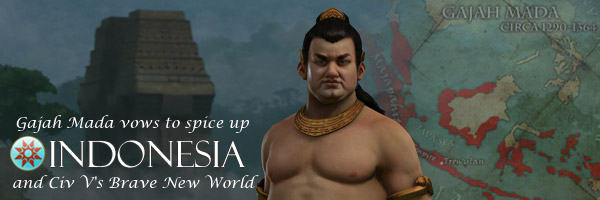
Continuing my series of Civilization V strategies, the third installation will cover Gajah Mada and his Indonesian "spice islands".
Indonesia is an Oceanic island nation between the Indian and Pacific oceans, north of Australia. Archaeological evidence shows that the region was inhabited by Homo Erectus, and that its primitive human occupants developed relatively advanced maritime technology, allowing them to sail across the ocean between the various islands of the Australian region as early as 42,000 years ago. Its early inhabitants took advantage of the tropical conditions to create flourishing agricultural communities and became masters of wet-field rice cultivation, as well as becoming traders and fishermen.
Much of the history of Indonesia has been shaped by maritime trade. Hinduism and Buddhism arrived in Indonesia around the seventh century through trade with India, and the Indonesian people welcomed these faiths with open arms and dedicated numerous temples (called "Candi") to the gods these religions brought with them. Islamic influences began around the thirteenth century in trade missions from the Middle East, and large portions of regional populations converted to this new religion. In the sixteenth century, Portuguese explorers brought Christianity to the islands. For the most part, the various religions in Indonesia intermixed and co-existed in relative peace and harmony. Portuguese traders quickly monopolized the trade of Indonesia's native nutmeg, cloves, and cubeb pepper. The Dutch arrived soon after and established their East India Company in the region and held tenuous control over the region until the Japanese occupation leading up to World War II. Following the war, bloody struggles for control of the nation resulted in hundreds of thousands of deaths, but democracy began to supersede authoritarian rule in the early 2000's. The Republic of Indonesia is currently the world's fourth most populous country, is the 16th largest economy in the world by GDP, and currently has dominion over 17,508 islands of the Indonesian archipelago.
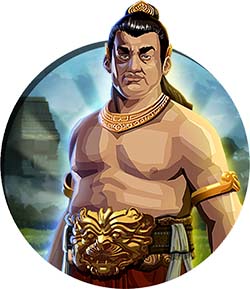
Gajah Mada (the "Elephant General") was a mahapatih (or "prime minister") of the Majapahit Empire during the early fourteenth century who, according to myth, made a vow not to eat any spices until he had conquered all of the southeastern Asian archipelago and united it under the empire. Little is known of his early life, but he lead the empire to the height of its power during this time and presided over the arrival of the first Muslim traders. His legacy has made him a symbol of Indonesian national pride to this day.
Success as the Indonesian Empire in Civilization V is partially determined by the player's ability to develop an intercontinental "island" empire, which grants access to the valuable nutmeg, clove, and pepper spices that dominated trade with Colonial European powers. Indonesia is also uniquely positioned in Civilization V to benefit greatly from possessing followers of multiple religions in its cities. [More]
de556f70-5074-40f5-9d73-25977fbbe320|4|4.5
Tags:Sid Meier's Civilization, Civilization V: Brave New World, Civilization V, Indonesia, Gajah Mada, Kris, Candi, Spice Islanders, nutmeg, pepper, cloves, luxury resource, invulnerability, sneak attack, heroism, ambition, restlessness, recruitment, enemy blade, evil spirits, religion, Hinduism, Buddhism, Islam, navy, embark, Polynesia, Kamehameha, island, swordsman, garden, Civ V Fall Patch, Civ-V
|

| 12 | | | | | | | 60 | | 11 | | | | | | | 55 | | 10 | | | | | | | 50 | | 09 | | | | | | | 45 | | 08 | | | | | | | 40 | | 07 | | | | | | | 35 | | 06 | | | | | | | 30 | | 05 | | | | | | | 25 | | 04 | | | | | | | 20 | | 03 | | | | | | | 15 | | 02 | | | | | | | 10 | | 01 | | | | | | | 05 |
|